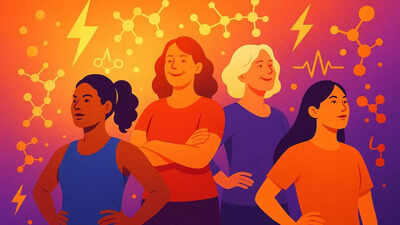On Instagram, YouTube, and even reality television, a new kind of women’s health trend has quietly taken hold. Influencers like Marcella Hill and stars from The Real Housewives of Orange County have openly shared their experiences with testosterone therapy — from renewed energy to a revived sex drive. Their posts, hashtags, and podcasts have created a growing digital trail, normalising what was once taboo. Studies also show that standard-dose testosterone can meaningfully improve women’s libido, mood, and energy levels, offering a measurable boost in sexual well-being. A recent report by The New York Times further highlighted this growing cultural movement, showing how women across the US are embracing testosterone as a tool for vitality, confidence, and connection — both in and beyond the bedroom.
A new hormone frontier for woman
Once associated exclusively with men, testosterone has become the latest symbol of female empowerment and biohacking. Women in their 30s, 40s, and beyond are turning to hormone therapy not just to address low libido, but to reclaim focus, drive, and physical vitality. On social media, the trend is often framed as a life upgrade — a way to “feel alive again.” Posts about “testosterone pellets” or “energy-boosting gels” now compete with fitness and anti-ageing content, blending medical science with lifestyle branding. The rise of telehealth clinics and wellness centres has made hormone optimisation more accessible than ever. These platforms promise customised care, though the doses and formulations often go unregulated. Critics warn that the lack of medical oversight risks side effects ranging from hair loss to mood swings. Still, the allure of renewed strength and confidence keeps many women committed.
Science, desire, and the search for balance
Testosterone is not merely a “male hormone.” In women, it plays a vital role in muscle maintenance, bone health, mood regulation, and sexual desire. Research shows that when prescribed in controlled, standard doses, it can restore women’s libido to levels similar to those in their late 30s. Medical societies such as the International Menopause Society and the Endocrine Society support its cautious use for postmenopausal women with low sexual desire, while warning against the unregulated, high-dose regimens popularised on social media. Experts told The New York Times that the hormone’s effects can be powerful — but unpredictable. Dr Stephanie Faubion, director of the Mayo Clinic Center for Women’s Health, said she’s seeing “more and more of these places popping up because of all the hype around testosterone,” cautioning that some clinics are prescribing doses that reach “levels that are normal in a man — but definitely not in a woman.” Similarly, Dr Susan Davis, an endocrinologist at Monash University, told the Times that while testosterone can meaningfully improve women’s desire and arousal, overstating its benefits or misusing it risks “turning a promising therapy into a fad.” Outside the US, regulators have moved faster. Australia and the UK already offer approved testosterone creams for women, and demand has surged dramatically in recent years. American women, by contrast, must often rely on compounding pharmacies or men’s testosterone gels used in micro-doses — usually without insurance coverage. This gap between science and access has created a grey market sustained by word of mouth, influencer testimonials, and online wellness clinics, where medical caution is often overshadowed by the promise of transformation.
The cultural shift behind the hormone hype
At the heart of the testosterone trend lies a deeper social story: women’s frustration with a healthcare system that often dismisses their midlife symptoms. Many feel underserved when it comes to fatigue, low libido, or hormonal imbalance. Testosterone, marketed as a kind of modern elixir, promises what traditional medicine hasn’t delivered — control, vitality, and confidence. The cultural tone has shifted too. Where hormone replacement therapy once carried stigma, today’s conversation is about optimisation and empowerment. For many women, testosterone represents more than a medical treatment — it’s a symbol of agency in a world that equates youth with worth. Whether shared through filtered Instagram videos or confessional YouTube vlogs, the message is clear: this is not just about sex drive, it’s about reclaiming identity.
Between empowerment and experiment
Still, experts warn that the surge in self-directed hormone use could have long-term consequences. Without proper clinical studies on high-dose or compounded testosterone for women, questions remain about cardiovascular health, fertility, and mood effects. Some doctors are calling for the FDA to fast-track research and introduce a regulated product for women, arguing that the demand already exists — and ignoring it only pushes patients toward risky alternatives. Until then, the testosterone movement will continue to straddle the line between empowerment and experimentation. In a culture obsessed with performance, many women see the hormone not as a medical intervention but as a tool of modern survival — one that promises to restore not just libido, but a sense of power, focus, and freedom.
